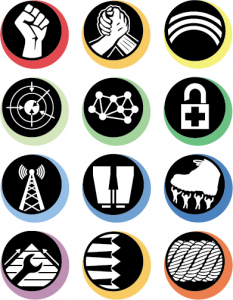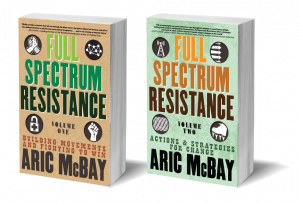We fight because holding back won’t make us safer. Fighting back is scary. And it can be dangerous. So any excuse that allows us to take the temporarily safer route, to hold back, can be tempting. In any strategy there is a time to hold and a time to push forward. But in the big picture and the long term—when things get really bad—fighting back can make people more safe, not less safe.
During World War II there was a secret dissident group in Germany called the Kreisau Circle. About twenty anti-Nazi dissidents from various backgrounds met hundreds of times during the war to discuss what to do. Their major topic of conversation was what to do after the war. That is, how to organize some future Germany in a way that would prevent someone like Hitler from seizing power again.
They drew up plans for a decentralized society based on small, distributed, agrarian communities. These autonomous rural villages would be much harder to entrap in centralized authoritarianism. I’m sure that their basic blueprint would be appealing to many back-to-the-landers or Transition Town enthusiasts. The problem was that they spent so much time thinking about how to prevent a future war while an actual current war—and the Nazi Holocaust—raged on around them. Yes, they were brave and it took courage to engage in any dissident political thought in Nazi Germany. But in hindsight, this was probably not the highest priority.
The Kreisau Circle chose a goal that was relatively safe—remaking a future German society—but also one that they had no leverage over. A few associates of the circle became discontented with the lack of action and carried out a failed assassination attempt against Hitler on July 20, 1944. Those failed assassins were hanged, along with many members of the Kreisau Circle and other dissident groups. When things get really bad, holding back doesn’t help.
I asked Dakota activist and writer Waziyatawin about collaboration and resistance among Indigenous peoples. “I think there are a couple of important lessons I draw from Indigenous resistance struggles here,” she told me. “The first is that it mattered little whether people resisted, fled, or acquiesced to colonizer society because in the end we all suffered pretty much the same fate. Thus, if some of our people are engaging in acts of resistance today, we will not save ourselves by betraying that resistance. It is in our best interest to fight. Second, if our ancestors could have seen what would become of our homeland and people, I think they would have fought harder. Today we have every reason to believe that this society will only continue on this pathway of destruction—a notion our ancestors would have had a difficult time imagining given its suicidal nature—so it makes sense for us to fight harder. We risk everything if we do not engage in struggle now. And, unlike our ancestors who were fighting against the rise of American empire, we are fighting amidst its decline.”
Though there is little to be gained from holding back, those who fight back often do gain something even in the darkest times. (They gain, at the very least, some self-respect.) Those who fought back in the Warsaw Ghetto or the Sobibór concentration camp had a higher survival rate than those who didn’t. In the modern day in Canada, suicide rates in some Indigenous communities are as high as eight hundred times the national average, while others have little or no suicide. The difference? A 2003 study showed that Indigenous communities who undertake militant or organized resistance have the lowest suicide rates.35 Fighting back can save lives in more ways than one.
It is possible to be too nice to those in power. I’ve written elsewhere about how John Brown, in the course of trying to seize an armory and start a guerrilla war against slavery, paused to allow the defeated defenders of the armory a chance to order out for breakfast and make escorted visits to their family. While he was doing this instead of staying mobile in the way that guerrillas must, an army unit marched over and captured his band. Brown and others were hanged. The consequence of John Brown being too nice (or perhaps, as a friend of mine suggested, trying to demonstrate compassion and empathy to slave-owners) was exactly the prolonged and bloody civil war that Brown had been trying to head off. Nice actions don’t always have nice consequences.
Understand that those in power have a different psychology than those who resist. Sociopaths, from dictators to con men, look at niceness or a desire to compromise and see vulnerability. They see an opportunity for exploitation. They see weakness.
Holding back won’t truly make us safer. But fighting back can. Of course, those in power will try to repress those who fight back, often violently. And of course they will attack those who are effective, and even those who are ineffective. That’s exactly why we have to stop them.


